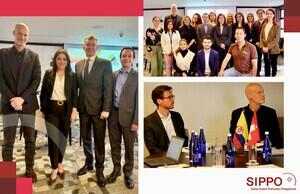Exit Strategy: Ensuring the legacy of SIPPO Colombia
SIPPO (Swiss Import Promotion Programme), driven by the Swiss State Secretariat for Economic Affairs (SECO) and implemented by Swisscontact, has been a fundamental pillar in strengthening Colombia's export capabilities through the capacity building of the beneficiary Business Support Organizations (BSOs): PROCOLOMBIA, the Bogotá Chamber of Commerce, ACOTUR, the Red Cacaotera, and FEDECACAO (the latter during the program's first phase).

SIPPO particularly focused on the sectors of Processed Foods, Natural Ingredients, and Sustainable Tourism. After eight years of collaboration, 2025 will mark the phase-out of this important program in the country, a carefully planned transition to ensure the sustainability and continuity of its legacy.
Exit strategy: Preserving SIPPO's impact
During the most recent Country Coordination Committee (CCC) 2024 meeting, key elements of the program's exit strategy were discussed, with participation of Clément Graf, Head of the Program, and Julien Robert, Head of SECO Cooperation at the Swiss Embassy in Colombia, alongside the BSOs, ANALDEX, the Colombian-Swiss Chamber of Commerce, and the SIPPO Colombia team. The attendees agreed on the importance of preserving SIPPO's impact and ensuring that the institutions and business organizations in the country continue to benefit from the skills acquired during the program.
A Focus on Long-Term Sustainability
The SIPPO program will close its operations in Colombia on December 31, 2025, and to ensure the permanence of its legacy and the appropriation of the tools and initiatives for strengthening trade capacities developed over the past eight years, an exit strategy has been generated. This strategy aims to transition from cooperation to sustainability, built on three pillars: 1) Knowledge management, 2) Network strengthening, and 3) Sustainable financing. These components seek to ensure that Colombian BSOs retain the technical knowledge acquired and that the network of actors in the export sector continues to grow alongside international markets.
- Knowledge Management and Dissemination: BSOs will have tools and programs that ensure continuous information transfer. This includes a repository of methodologies and tools on their platforms, training of trainers, educational campaigns to promote an export culture, behavioral economics, and the use of artificial intelligence for sustainability.
- Network Strengthening: Updating the Social Network Analysis of exports will be prioritized, focusing on connecting relevant actors in Switzerland and other international markets. The articulation of thematic networks and inter-institutional collaboration will be essential for BSOs to continue developing beyond SIPPO's exit. An ALUMNI program will be created to maintain the connection of Colombian BSOs (Ex-Alumni) with the program, for example, through mentorships for their peers. Communities of Practice (CoPs) will also be encouraged.
- Sustainable Financing: Although not a traditionally supported area by SIPPO, efforts will be made to promote public-private partnerships and financial support networks that strengthen BSOs' capacity to remain operational and relevant in the international arena
Trade Perspectives and Challenges for Colombia
Javier Díaz, President of the National Exporters Association (ANALDEX), presented an analysis of trade relations between Colombia and the EFTA (European Free Trade Association), with Switzerland as a key player. While Colombian exports are predominantly based in the mining-energy sector, significant opportunities were identified to diversify export offerings in agricultural products and value-added goods.
Colombia's potential as a food supplier is immense, given the growing global demand. However, it was also highlighted that internal challenges, such as the lack of infrastructure, customs modernization, and digital connectivity, need to be overcome to facilitate more competitive foreign trade.
Lessons Learned and a Future Legacy
SIPPO has been key in creating specialized capacities in strategic sectors such as processed foods, natural ingredients, and sustainable tourism. Participants in the CCC 2024 agreed that the program has enabled BSOs to adapt to new trends, comply with international regulations like the European Green Deal, and seize global networking opportunities. It is crucial that these capabilities are maintained and continue to evolve for Colombia to solidify its presence in international markets.
The Path Forward
The success of the phase-out not only depends on SIPPO but also on the ongoing commitment of the BSOs and actors in the Colombian export sector. As Clément Graf expressed, the program's purpose has always been to establish lasting capacities that allow BSOs to thrive once SIPPO concludes its intervention in Colombia.
In 2025, the program will focus its activities on reinforcing the capabilities of participating institutions—PROCOLOMBIA, the Bogotá Chamber of Commerce, ACOTUR, and the Cocoa Network—to ensure that SIPPO's legacy continues to generate long-term impact. Colombian BSOs will remain connected to the global export promotion network, ensuring that although the program concludes, the tools and knowledge acquired will remain relevant and in constant use.
Conclusion
The exit process of the SIPPO program in Colombia represents a new challenge but also a unique opportunity for Colombian institutions to continue advancing their consolidation as key players in international trade. The proposed strategy, with a focus on sustainability and collaboration, guarantees that the achievements reached during the program's implementation will continue to benefit the country for many years to come.
The support from Switzerland and the close collaboration with Colombian business and government sectors are a testament to well-done work and confidence that Colombia will continue to strive for sustainable and inclusive growth driven by its exports.



 Bosnia and Herzegovina
Bosnia and Herzegovina











